The ultimate guide to choosing the best solar battery
A guide to evaluating and buying a solar battery.
Our solar battery storage guide evaluates the feasibility of batteries and tells you how to select the best solar battery, with the functionality that you need. This guide is suitable if you already have solar panels or if you are looking at a new panel and battery system.
Our guide also contains a list of the best solar batteries.
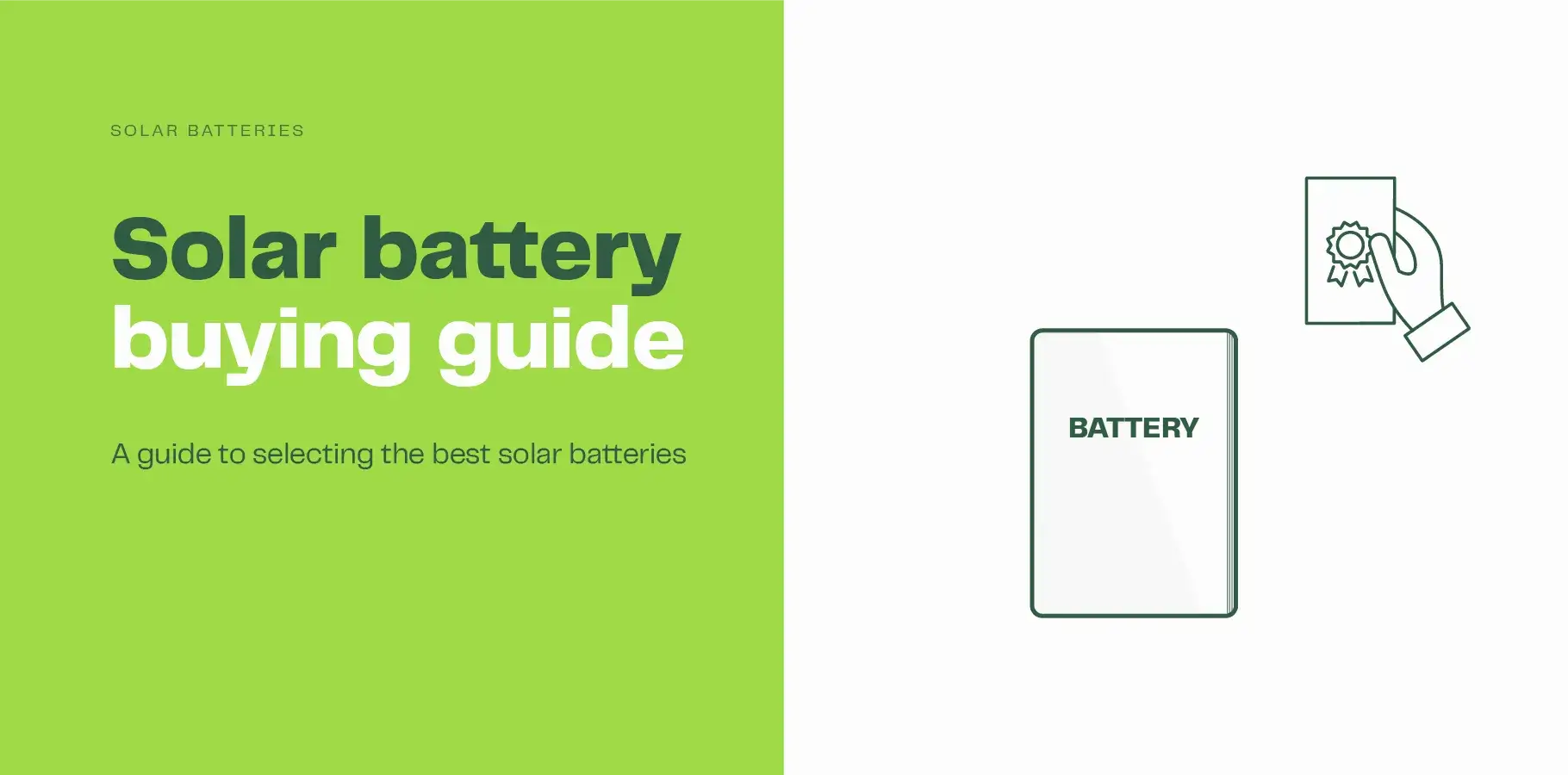
What is solar battery storage?
A solar battery storage system allows you to store the solar energy that you generate during daylight hours for use at night.
Solar panel systems generate most of their electricity during daylight hours, when for many people, they do not have a need for the electricity. The excess electricity can instead be stored in a battery.
Further reading: How does battery storage work?
Advantages of solar battery storage
There are four main reasons why you might consider battery storage:
- To save money
- To use your solar power at night
- For backup power
- Energy independence
Backup power during a blackout
Given that the viability of solar batteries is questionable, backup power is for many one of the key reasons to buy a battery. However, not every battery system comes with backup power, and if they do, it comes at reduced capacity and an added cost.
Further reading: A guide to solar battery backup
Lifespan and reliability
If you buy good solar panels, you can expect them to last for 25 years. The best solar panels will even operate at 90% of their rated output after 25 years. It is a different story for batteries. Solar batteries typically come with a 10-year warranty and their useful life cannot be expected to extend beyond this period. If you regularly cycle the battery, the battery warranty shortens and it won’t last as long.
Reliability issues
There are reported reliability issues with solar batteries long before they reach the end of their useful life. The Australian Renewable Energy Agency (ARENA) has funded an independent lithium-ion battery trial, conducted by ITP Renewables, that has now completed 6 years of testing. The aim of the trial was to test a selection of the solar batteries available in Australia for their performance and reliability.
Results from the independent battery trial
With the third phase of independent testing complete, the report concludes that: the number of battery failures was higher than expected and that manufacturers are now moving towards integrated battery and inverter products that are only compatible with inverters from the same manufacturer.
The results from this independent trial are factored in to our selection of the best solar batteries. When weighing up whether solar batteries are worth it, you should consider any potential reliability issues.
Battery trial results: You can access the battery trial summary here.
Selecting the best battery
Selection criteria
When selecting the best battery for your needs, you should consider:
- Battery size
- Reliability
- Cycle life
- Warranty
- Functionality
- Value
- Australian presence
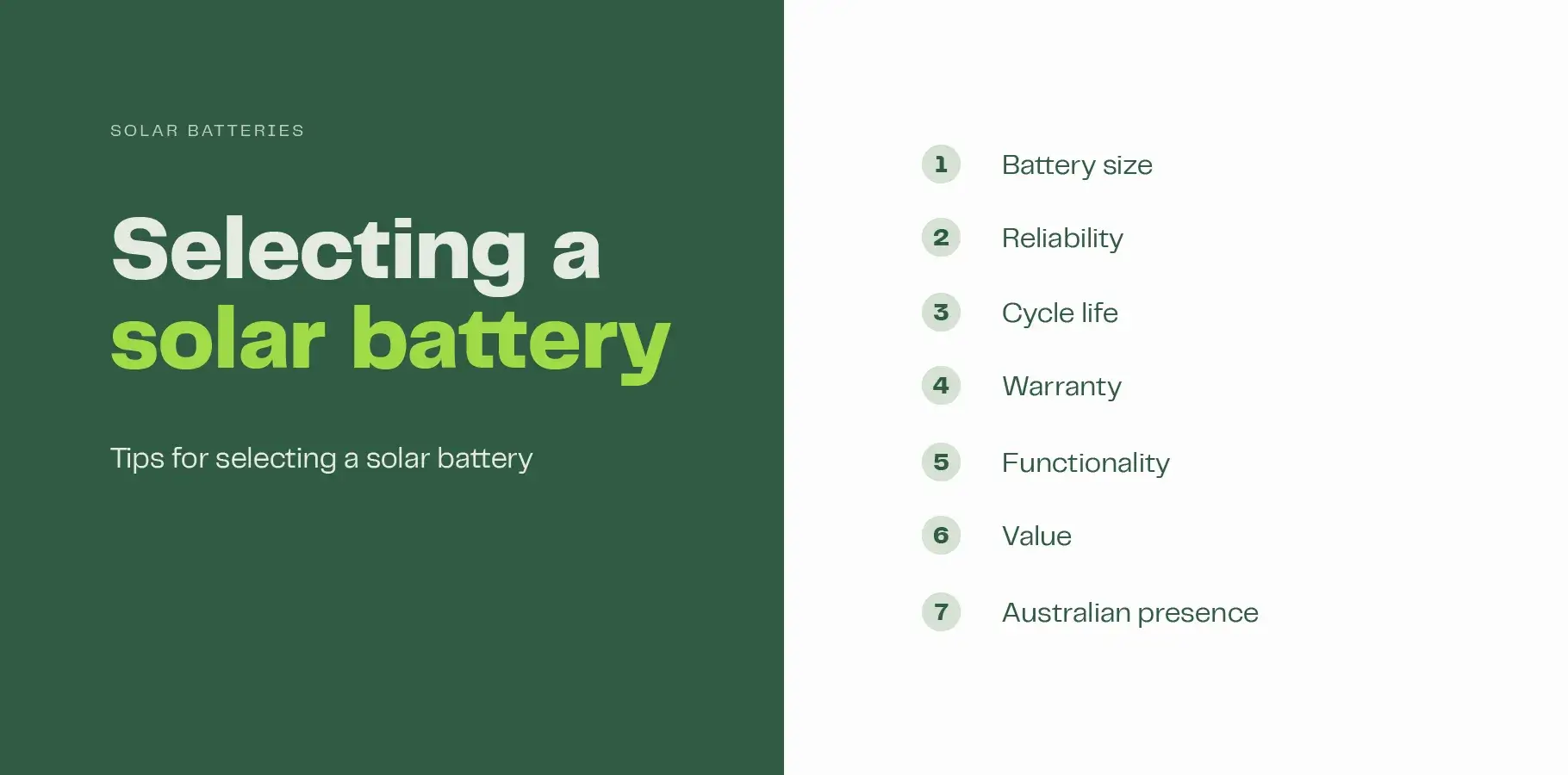
Battery size
The battery size is the storage capacity of the battery. Smaller batteries are suitable for smaller solar panel arrays, likewise, larger arrays are better suited to larger batteries. There is no point pairing a Tesla Powerwall II with a 3kW system.
Reliability of batteries
Any reliability issues should be factored into your selection of a battery.
Cycle life
The cycle life figure represents how many times the solar battery can charge and discharge before the battery is no longer usable. For most batteries, the cycle life is around 4,000 cycles which allows for daily charging and discharging over a 10-year period.
Warranty
Most solar battery warranties are valid for 10 years. The warranties typically correlate with the number of cycles. Though warranties are a ranking factor, it is worth considering that currently no lithium-ion battery has been installed for 10 years or more in Australia.
Functionality
You need assess whether or not the battery can be configured to do what you want it to do. If you need backup power, not every battery can provide it.
Value for money
We prefer to use value as opposed to price as a ranking factor. If a battery is twice as dear but lasts three times as long, it is better value. Value is subjective too, it’s very much on you as the buyer, to determine what is value in your own eyes.
Australian presence
An Australian presence for the battery manufacturer is important in case something goes wrong. It’s far easier to speak to Australian representatives than it is a consultant overseas. A local presence also demonstrates the manufacturer’s commitment to the Australian battery market.
The best solar batteries
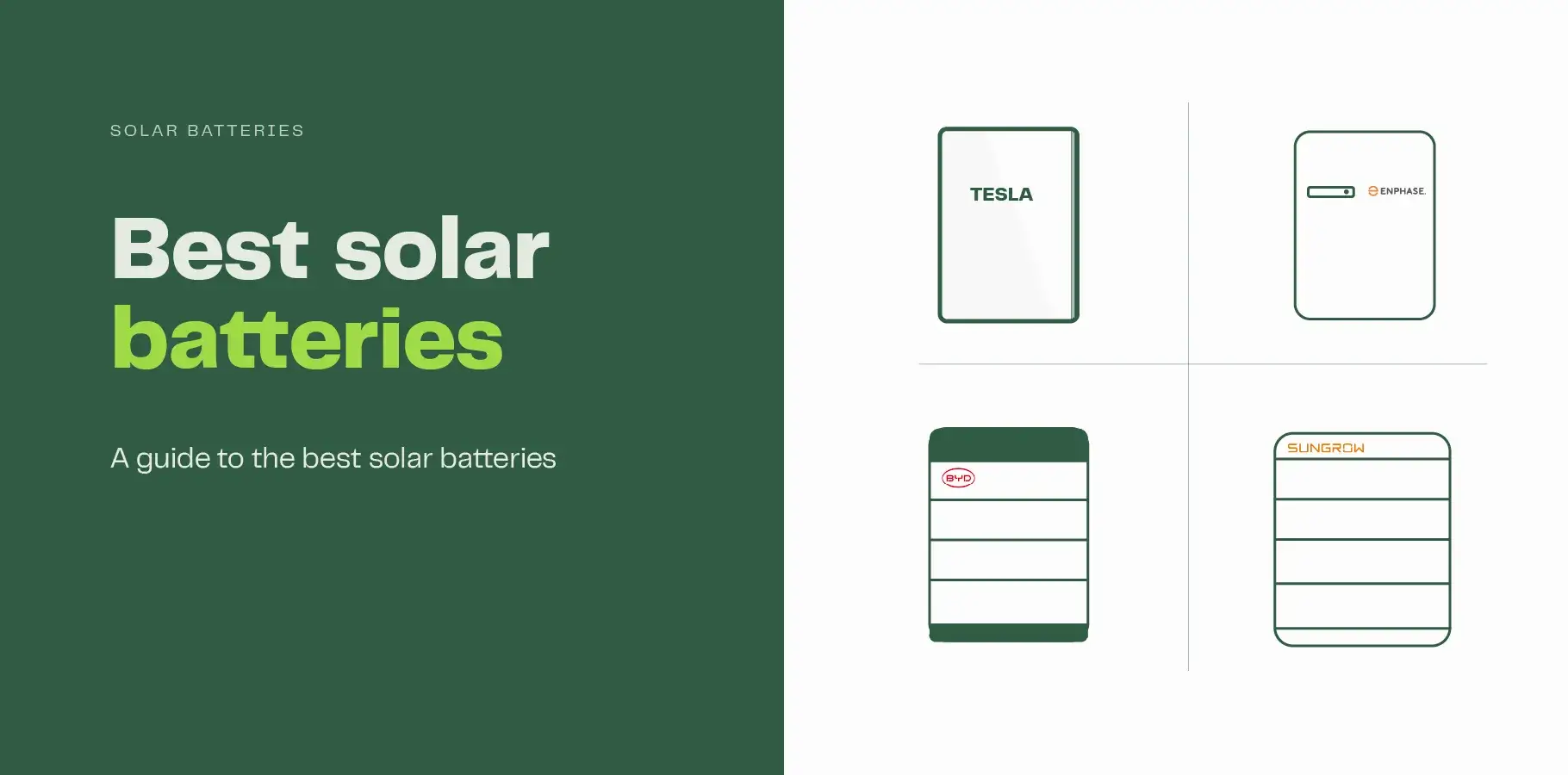
Solar batteries come in different sizes. Some batteries are suitable for small systems while larger solar panels arrays will be better paired with a larger battery.
The tables below show the best quality batteries according to their size:
Best small batteries (5 kWh and under)
| Brand: | Size: | Reliability: | Cycle life: | Warranty: | Value: |
|---|---|---|---|---|---|
| Sungrow | 5 kWh | Good | 6,000 cycles | 10 Years | Very good |
| Enphase | 1.2 kWh | Good | 3,650 cycles | 10 Years | Good |
The two best batteries for small solar power systems are:
- Sungrow
- Enphase
Sungrow battery
The Sungrow battery is a well-priced small to medium size battery. At 4.8kWh, the battery is large enough to service smaller panel arrays. So far, the Sungrow battery has performed well during reliability testing.
Enphase battery
The Enphase battery comes in 1.2kWh units that can be added to at any point in time. The Enphase solar battery is an AC battery capable of being fitted to any system. One downside to the batteries is that they do not have backup power functionality.
Best solar batteries (over 5 kWh)
| Brand: | Size: | Reliability: | Cycle life: | Warranty: | Value: |
|---|---|---|---|---|---|
| Tesla | 14 kWh | Good | 4,000 cycles | 10 Years | Good |
| BYD | 4 – 256 kWh | Good | 4,000 cycles | 10 Years | Good |
The two best battery storage options for larger household grid-connect systems are:
- Tesla Powerwall II
- BYD
Tesla Powerwall II
The Tesla Powerwall II battery can be fitted to any grid-connect system. It is reasonably priced and represents reasonable value for money and has performed well during recent testing.
BYD – LVS & LVL
The BYD batteries are fast becoming one of the most popular available in Australia. You can take some comfort in the fact that the BYD batteries are compatible with a wide range of hybrid and off-grid inverters.
Both the BYD and Tesla Powerwall II batteries are a good battery size for a 5kW system.
Solar battery prices
Adding solar battery storage to your system will allow you to save extra dollars, but it will come at a price. Solar batteries are relatively expensive, and the payback period is longer than for solar panels.
It is more economical to include solar battery storage as part of a new solar power system as opposed to adding a battery to an existing system. The table below shows typical solar battery prices for new systems, and adding to existing systems.
Battery prices for new and existing systems:
| 5 kWh battery | 6.4 kWh | 10 kWh | 14 kWh | |
|---|---|---|---|---|
| New system: | $5,500 | $6,800 | $10,000 | $14,000 |
| Adding to existing:* | $7,700 | $9,000 | $12,500 | $15,700 |
*Assumes a new hybrid inverter is needed to install the battery.
The average cost of batteries
The table shows that the average cost of solar batteries is around $1,000 / kWh. This figure can be used as a rough guide; if you want a 10kWh with a new system, expect to add around $10,000 to the cost of the solar panels.
Hybrid inverter add-on
If you already own solar panels, and are wanting to add a battery, you may need to pay for an additional inverter and charger. If you purchased a battery ready system, you will likely avoid this additional cost, provided the battery you select is compatible with your hybrid inverter.
The cost of a hybrid inverter and charger varies depending on the size of the battery you need, but typically adds over $2,000 to the cost of the install.
Solar battery price variables
There are several variables that will affect the price you ultimately pay for a solar battery. The size, brand and quality of the battery you choose will have a big bearing on the price, as will any add-ons you may opt for. Battery price variables include:
- Applicable solar battery rebates
- Added functionality eg. Backup power
- If your existing system is compatible
- Battery brand
- Battery size
Battery rebate schemes
The solar battery prices and payback periods we refer to above do not include any battery rebates. There are state-based rebate schemes that can significantly decrease the cost of solar batteries and in turn shorten the payback period.
Payback periods and savings
Typically, a panel and battery system will payback somewhere between 7 – 13 years. If you already own solar panels and are just adding a battery, the payback is far greater, more like 15 – 25 years.
To assess the viability of battery storage, we will compare the results for a 6.6kW system with a 10kWh battery in Sydney – with no battery, buying a panel and battery together and adding a battery to an existing system:
Solar battery financial results for a 10 kWh battery:
| Cost | Annual savings | Payback period | Longevity | |
|---|---|---|---|---|
| Panels only: | $6,650 | $1,301 | 5 Years | 25 years |
| Hybrid system: | $17,150 | $1,943 | 9 Years | 10 years |
| Battery only: | $10,500 | $642 | 16 Years | 10 years |
*Figures based on electricity bills of $450 per quarter.
Results from our solar panel and battery calculator
The results below are straight from our solar panel and battery calculator and show the typical cost, savings and payback period for a 6.6kW system with a 10kWh battery, in Sydney:
6.6kW Solar panel system:
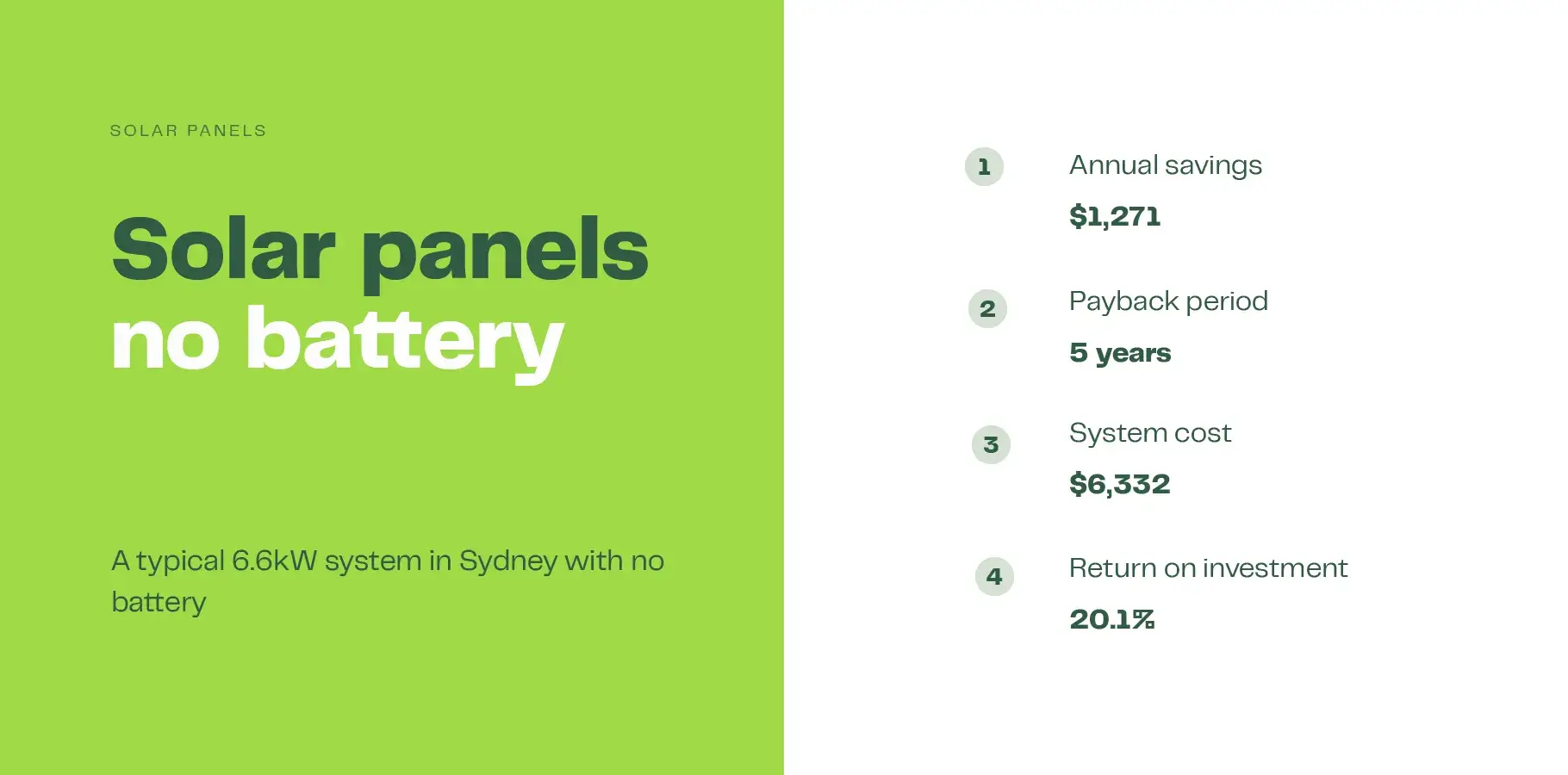
6.6kW solar panels with 10 kWh battery:
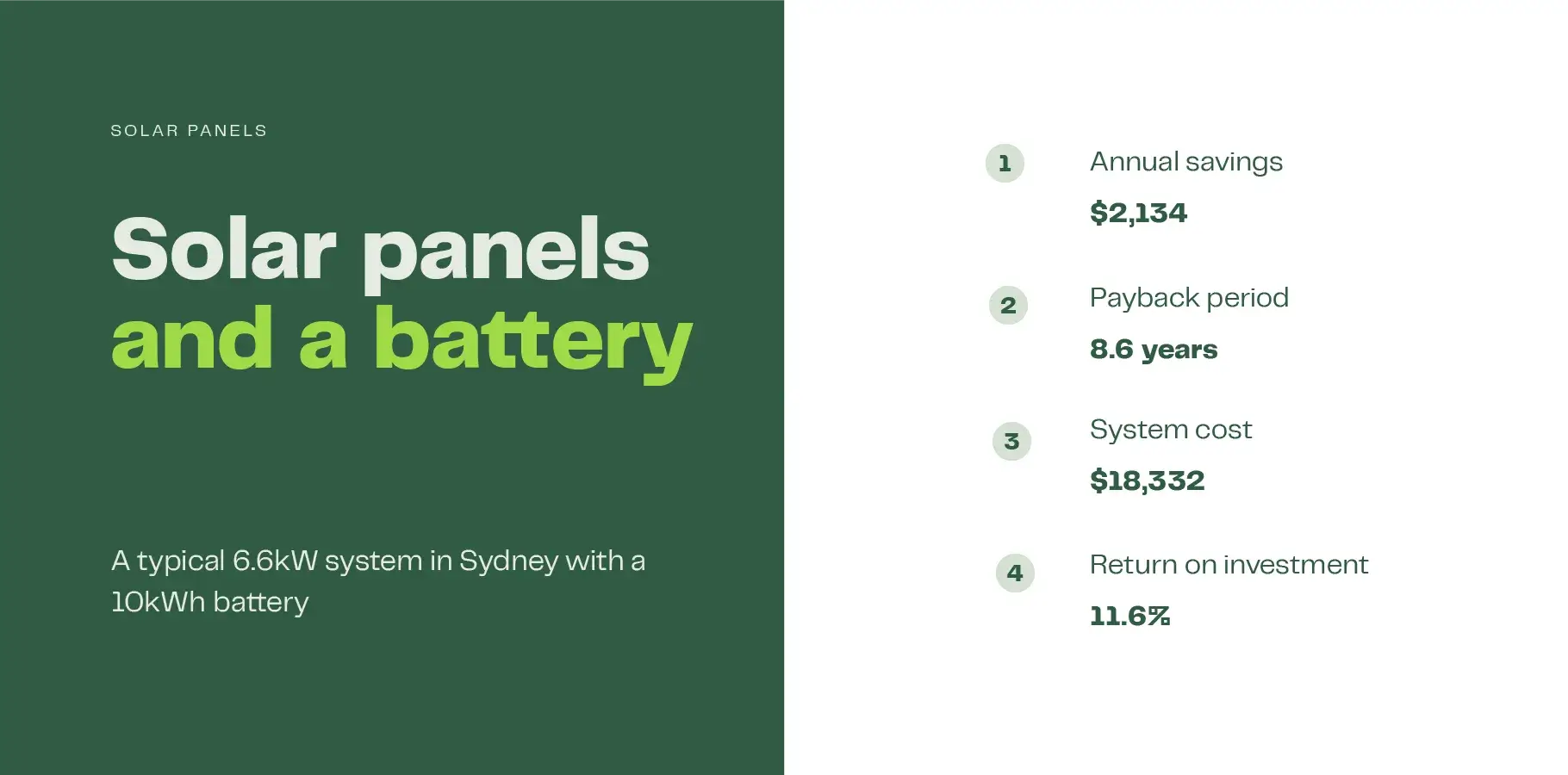
10 kWh solar battery:
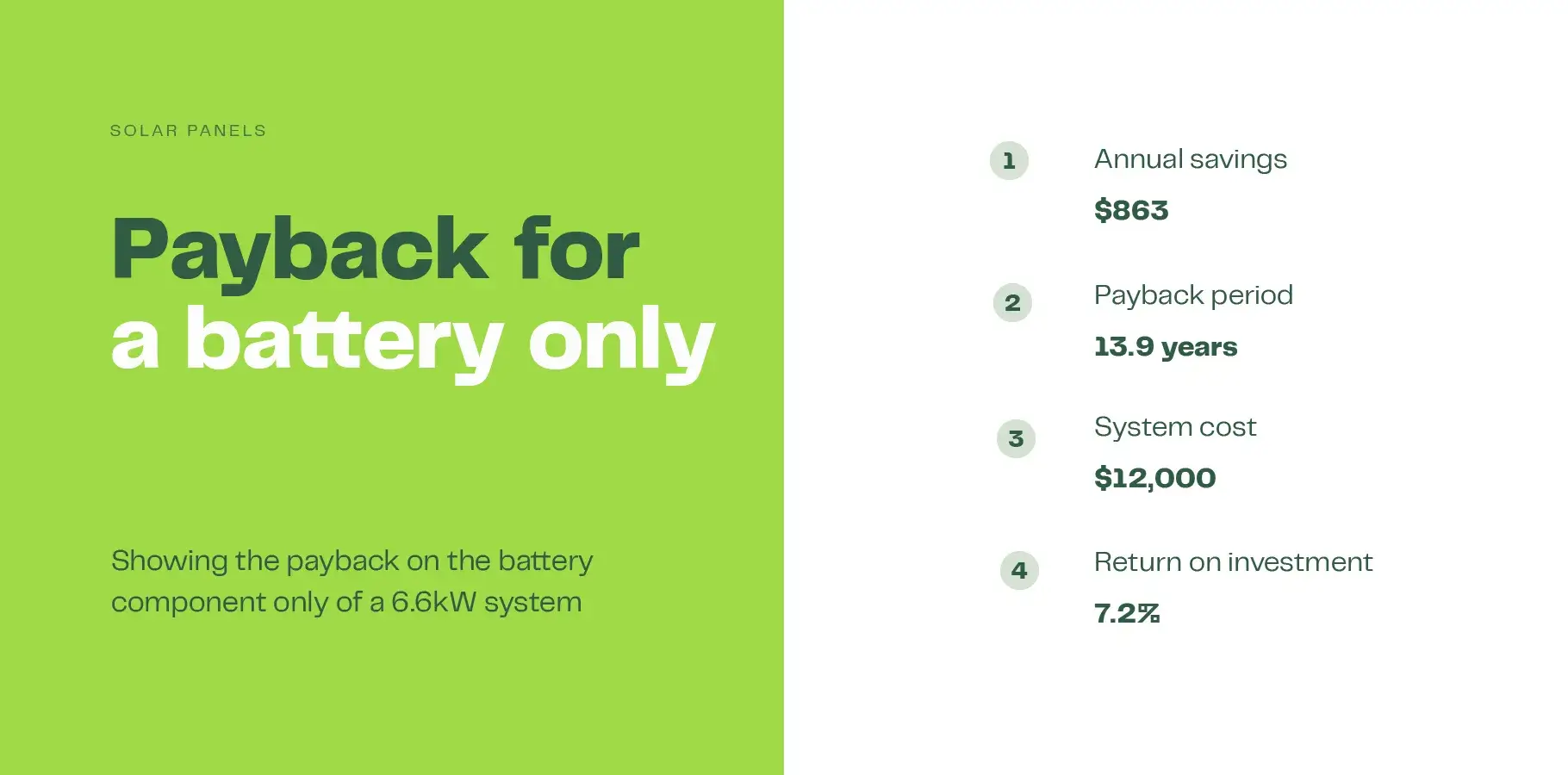
Are solar batteries worth it?
All things being equal, we would recommend you buy solar panels and delay your battery storage purchase. Solar panels are worth it and can payback off within 4 – 7 years, better still, they last 25 years.
Not financially worth it, yet…
At this point in time, solar batteries are not worth it. Given that the useful life of a solar battery is around 10 years, adding a solar battery to an existing system is not financially worth it, as you will not generate enough savings in a 10-year period to pay off the battery.
For new solar panel and battery systems, payback is much closer to the 10-year mark and buying a battery storage system is marginal at best. However, when we split the battery from the panels, the payback for the battery component is well beyond the 10-year useful life of the battery. The outlay for a solar battery storage system is also considerable.
Our analysis also concludes that solar batteries are more financially viable if:
- You are a high electricity user
- You don’t use much daytime electricity
Battery ready system
You may consider buying a battery ready system with a hybrid inverter in preparation for a solar battery. While it is sensible to delay the purchase of a battery, you need to consider when you plan to install it. If you do not buy a solar storage solution within three years, technology may render your hybrid inverter redundant. It also costs a little more to buy a battery ready system.
Quotes from the best installer companies
We can provide you with quotes from installer companies that meet all of our strict vetting criteria. Compare your quotes with confidence knowing that they are from three of the best companies that service your area.

Are you ready for the benefits of solar?
Get 3 free quotes and start your journey towards making the switch.
Get free quotes